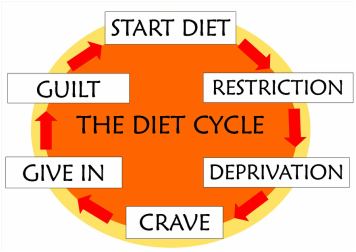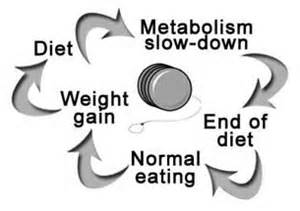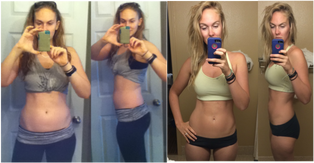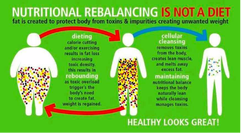Why I Initially Gained 60 lbs on a High Carb Vegan Diet

In this blog post, I explain why I initially gained weight (which is probably why you've gained weight), as well as how long it took before my health started improving and my body began releasing the extra weight. So lets get started!
BEFORE: My diet and lifestyle
Prior to adopting a calorie sufficient, high carb vegan diet in March 2012, I spent the previous 6 years destroying my health through chronic dieting, overexercising, and stimulant/drug abuse. I went on my first diet in 2006, following the "eat less, exercise more" model after gaining the "freshman 15" while in college. My first dieting attempt was a success, and I was able to drop my weight from 170 lbs to 150 lbs in 3 months, which was proof to me that dieting worked. As time went on, I became obsessed with pushing my results further, motivated by famous supermodels and actresses who were my height (5'11") and maintained a svelte 120lb frame. In an effort to lose more weight, I avoided foods containing carbohydrates and fat, severely limited my calories, took various weight loss pills, drank coffee and energy drinks, opted for Diet sodas and artificial sugar sweetened diet foods, exercised 2x/day, abused pain killers (appetite suppressants) and alcohol, and smoked cigarettes. At the time I was also suffering from a digestive disorder (IBS, gastroparesis) that I "managed" through laxatives. When I could no longer maintain my strict diet, I would find myself binging on any food available (ice cream, peanut butter, pastries, bread, meat, pretzels, etc.), and later vomiting and punishing myself at the gym out of guilt. This behavior continued until the end of college, and despite seeing therapists and practicing yoga, I could not stop. The problem was not my behavior though, it was my mentality towards food. Denying myself calorie/carbohydrate-containing foods triggered obsessive compulsive behavior, all of which was wreaking havoc on my health.
When I started graduate school in 2009, I was following a 1200 calorie, high protein, low fat diet and taking enough stimulants to keep my appetite at bay to prevent binging. Essentially, I exchanged binging for sustained restriction, and was able to drop down to 135 lbs. While learning about plant-based nutrition in graduate school, I decided to adopt a raw vegan diet that would still be low in calories, fat, and and carbohydrates. My new diet centered around intermittent fasting and drinking green juices, allowing me to drop another 15 lbs, weighing in at 120 lbs- my goal weight.
 November 2011-November 2012: 60 lb weight gain following post-dieting recovery
November 2011-November 2012: 60 lb weight gain following post-dieting recovery By the end of 2011, it started to hit me that my health wasn't doing so hot. Since quitting birth control in 2010, I had not had a period, and became somewhat concerned about my hormonal health. I was also suffering from depression/anxiety, insomnia, anemia, chronic fatigue, brain fog, emotional instability, muscle wastage, dry/pale/paper thin skin, severe digestive distress, inability to handle stress, and feeling cold all the time. When I saw myself in the mirror or photos, I thought my face looked old and aged, and despite all my dieting efforts, cellulite seemed to easily accumulate on my frail, thin frame. The reality that I had damaged my system through years of malnourishment and restriction finally started to hit me, so I decided to look into a healthy, much more sustainable approach to 1. improving my health and 2. staying lean. After a few nights of research, I came across Freelee the Banana Girl through Youtube. She had a similar dieting and health history as myself, and touted a high carb, low fat, unlimited calorie, fruit-based diet as the ultimate healing therapy. I had nothing to lose so I gave in, completely letting go of control over my food intake, and filled my body with all I could afford in terms of fruit, vegetables, and other low fat plant-based foods. Within days, my digestive system was back on track without the use of laxatives for the first time in years. I also started feeling and sleeping better. After a month or two, my period came back and skin quality improved. But despite my increasing health, my weight was endlessly on the rise. I gained about 30lbs in the first 3 months, and 60 lbs after 1 year on my calorie/carbohydrate/nutrient sufficient diet.

All the dieting, pill popping, overexercising, and fasting I had done caused a situation in my body known as metabolic damage. Metabolic damage is the physiological result of neglecting to fulfill basic metabolic needs (ie. sufficient hydration, calorie/carb intake, rest, etc.) for long enough that it causes biochemical changes within the organism. Due to the lack of nutrition, the body enters a state of chronic stress, and functions sub-optimally, creating a breeding ground for chronic health conditions.
Calorie/carbohydrate restrictive diets (below 2000 calories/day for women, and 2500 calories/day for men) are the primary cause of metabolic damage because they act by slowing down the functioning of the system (aka the metabolism) as well as create nutrient deficiencies. All of our cells run solely on glucose for fuel, with carbohydrates being the most preferred source due to their efficient breakdown and easy conversion to glucose. When calories/carbohydrates are restricted from the diet, our carb-burning cellular machinery switches over to fat/protein burning in order to maintain the generation of glucose for energy production. This fat/protein burning process (known as gluconeogenesis, ketosis) is extremely inefficient and energy demanding, so our basal metabolism lowers in an effort to conserve fuel (seen as lowered body temperature). Within days of dieting, our glycogen stores empty, draining our system of both stored carbohydrate energy and water, reflecting about a 10 lb loss on the scale. As the body enters ketosis, it further dehydrates in an effort to dilute the toxic byproducts generated from fat/protein burning, reflecting another 10 lb loss on the scale. Meanwhile, blood levels of leptin (our appetite and metabolism control hormone) plummet, increasing the appetite and further slowing the metabolism until normal eating is resumed. If appetite suppressants or stimulants (caffeine, nicotine, phentermine, aderrall etc.) are used to combat the rise in appetite, the adrenals and entire hormonal system become unbalanced due to chronic sympathetic nerve stimulation (seen as elevated cortisol). The lack of carbohydrates in the diet also cause serotonin to deplete, resulting in sleep disturbances, depression, anxiety, and irritability. The sex hormones (estrogen, testosterone, and progesterone) also become unbalanced due to calorie/carbohydrate insufficiency, causing low sex drive and amenorrhea (in women).
Depending on how long the diet is kept up, the body will continue to release fluid (causing chronic dehydration) and burn body fat/muscle in order to stay alive. This all occurs at the expense of our health, as the energy and nutrients required to support the normal functioning of the body is not available. Once the diet can no longer be continued and normal eating is resumed, the body hoards calories, carbohydrates, nutrients, and water in an effort to return to homeostasis (normal functioning). Weight gain is the result of putting food and fluid into a nutrient/calorie/carbohydrate/water deprived system. In my case, even though I was putting in the most nutritious foods, I gained weight because I had metabolic damage from prolonged malnourishment, dehydration, and energy starvation.
Note: The time following a period of dieting or starvation is the ONLY time (metabolically) carbohydrates are converted into excess body fat.
The answer to this question varies. For most people, after giving up dieting/restricting carbs/calories, the body will assume it's pre-dieting weight plus 10%. This is exactly what I experienced. After I reached 185 lbs, my weight plateaued whilst continuing to eat as much quality, high carb, low fat, plant-based vegan foods as I desired. At that weight, I had a BMI (body mass index) of 25.8, which is slightly overweight for my height, but normal AND necessary for any person coming from a dieting and health background similar to my own. The amount of weight gained will also strongly depend on the type of food you consume while recovering. Sticking to a high carb, low fat, low sodium, plant-based vegan diet will ensure healthy weight gain, health restoration, as well as gradual, permanent, healthy weight loss over time. High fat, protein, and sodium foods will promote weight gain, but stall weight loss as they contribute to excess body fat and fluid storage.
 March 2013-May 2015: 30 lb weight loss following an unlimited calorie, high carb, low fat, plant-based vegan diet
March 2013-May 2015: 30 lb weight loss following an unlimited calorie, high carb, low fat, plant-based vegan diet The answer to this question will also vary, and depends largely on how committed you are to consistently maintaining a healthy, low fat, plant-based diet and lifestyle. I was in pretty bad shape when I first got started, but I consistently consumed enough carbs/calories/nutrients/water daily to fuel my system back to health. On average, I've consumed 2500-4000 calories/day with a daily ratio of 80-90% carbohydrate, 5-10% protein, and 5-10% fat. I've also averaged 10 hrs of sleep/night, less than 1000 mg of sodium/day, 3 liters of water/day, and 30-90 mins of daily, easy-moderate exercise sessions (mostly cycling, jogging, walking, swimming, yoga, body weight exercises). Following this protocol, I have been able to drop 30 lbs in 3 years, reverse all health conditions and nutrient deficiencies, and achieve a very high level of health EFFORTLESSLY. The amount of time it takes will depend on your health and dieting history, but most importantly, the post-dieting recovery plan. I've known some young women to bounce back within a year or two on a similar diet and lifestyle to my own, but for myself it took 2 years of maintaining my weight gain before my weight started to shift back to a lean body weight.

The primary reason it takes so long to drop the weight on a calorie sufficient, high carb, low fat, plant-based vegan diet and healing lifestyle following prolonged dieting/restriction, is because initially it takes a tremendous amount of energy to repair the damage done to the system. Toxin/acid build-up, tumors, nutrient deficiencies, organ damage, anemia, hormonal imbalances (estrogen, testosterone, progesterone, thyroid, leptin, serotonin, etc.), bone de-mineralization, blood sugar instability, muscle wastage, low blood volume, etc. ALL require enormous amounts of carbohydrate energy and nutrients to be eliminated and/or restored back to normal. The body works in order of priority, meaning the most damaged/toxic areas are addressed first. Excess body fat removal usually takes the back seat as it's not a life threatening condition, and is initially necessary in order to bring the body back into health and reset hormone levels. By design, body fat functions to protect us from accumulated insulate for body temperature regulation, and provides signaling for hormones including sex, thyroid, and leptin. Once health is restored (all systems functioning optimally) THEN excess body fat will be addressed and eliminated BUT only if enough nutrients and carbohydrates/calories are present for it's removal.
Forcing weight loss through calorie/carbohydrate restriction is not a sustainable way to lose weight, and the weight loss is done so at the expense of our health. In fact, forced fat/fluid loss actually releases stored toxins from body fat into the blood stream and tissues, causing them to increase in concentration due to their inability to be removed. This creates an extremely toxic condition within the system because the buffering components (fat and fluid) have been removed without the safe processing of the toxins, creating a breeding ground for chronic poor health conditions. Under normal conditions (a carbohydrate/calorie/nutrient sufficient diet), the body is able to efficiently process the toxins within stored body fat as the fat is broken down and eliminated. Sufficient intake of nutrient dense, high carbohydrate foods are required for efficient fat metabolism! Why put yourself through all the torture of food denial and carbohydrate restriction when your body is designed to EAT in order to stay lean and healthy. It's just about putting the right kinds of food in your system; filling up on the tastiest fruits, vegetables, and low fat plant-based dishes (check out my Recipes for meal ideas)! Weight loss is easy and sustainable on the right diet and lifestyle!
So there you have it, my weight gain EXPLAINED! Feel free to leave me any questions/comments down below! Next, I plan to do a post about how I LOST 30 lbs following the same diet that made me initially gain 60lbs! Stay tuned folks and thanks for reading :)
 RSS Feed
RSS Feed
